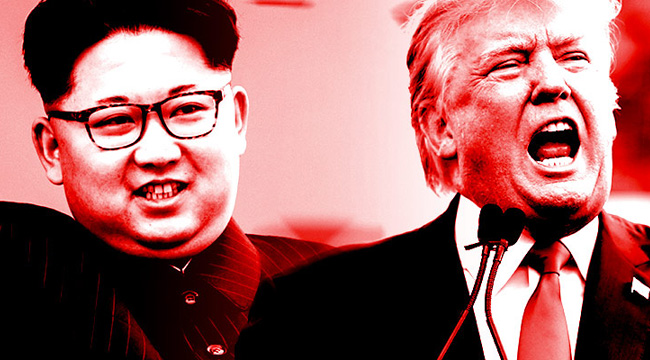
Donald Trump receives unsavory endorsements on a regular basis. White-supremacist organizations often sing his praises, and the National Enquirer bestowed its dubious sticker of approval on the Republican nominee. Trump ignores most of these developments, and they roll right off his gold-plated existence. However, one brand new endorsement shines bright above all others as an indicator that all is not normal in this presidential race. This pat on the back also illustrates why President Trump could work irreparable damage to not only America but the world. North Korea — a country which once “nuked” Washington, D.C., in a propaganda video — has endorsed the candidate who once threatened to make Kim Jong-un “disappear.” What in bizarro world is happening?
On Tuesday morning, a curious op-ed appeared on a North Korea state media website. The piece stood as a direct response to Trump’s recent Reuters interview, when the real-estate mogul said he wants a sit-down with Kim Jong-un. Trump thinks his famous negotiating skills could work a lot of magic: “I would speak to him, I would have no problem speaking to him.” Of course, Trump’s referring to a leader who spent Tuesday morning gleefully laughing as he observed military missile tests. So, this endorsement is bad news to say the very least. Let’s dig further.
The Plain Meaning Of The Endorsement
On behalf of North Korea’s capital, Pyongyang, the endorsement expresses well wishes for the Republican nominee. The North Korea Today news website translated the official state communication, which was penned by Han Yong Mook, a Chinese North Korean scholar. The column calls Trump “wise” and bashes “dull” Hillary Clinton:
“The president that U.S. citizens must vote for is not that dull Hillary — who claimed to adapt the Iranian model to resolve nuclear issues on the Korean Peninsula — but Trump, who spoke of holding direct conversation with North Korea.”
Clearly, North Korea doesn’t hold any respect for former Secretary of State Clinton, who favored a “strategic patience” policy for President Obama’s administration. Thus, the U.S. did not engage North Korea by offering incentives for pursuing nuclear-disarmament talks. This approach did little to ease the friction between North and South Korea, and Pyongyang continued to pursue aggressive missile development.
For what it’s worth, the state website message also praises Trump as a “far-sighted presidential candidate.” Of course, the American definition of “farsighted” means that Trump can’t see what’s right in front of his face. Many Republican voters would not argue with that implication, but Trump’s legion of fans outweigh any dissent.
Trump’s Prior Backhanded Insult Toward Kim Jong-Un
In January, the media ripped Trump apart for giving Kim Jong-Un “credit” for his “amazing” displays of power. Yet Trump also called the North Korean dictator crazy, so there’s a bit of context that deserves mention. Here’s the full quote from Trump:
“If you look at North Korea — this guy, he’s like a maniac, OK? And you have to give him credit. How many young guys — he was like 26 or 25 when his father died — take over these tough generals, and all of a sudden — you know, it’s pretty amazing when you think of it. How does he do that? Even though it is a culture and it’s a cultural thing, he goes in, he takes over, and he’s the boss. It’s incredible. He wiped out the uncle. He wiped out this one, that one. I mean, this guy doesn’t play games. And we can’t play games with him. Because he really does have missiles. And he really does have nukes.”
Even though Trump does acknowledge how dangerous Kim Jong-Un is, there’s still some begrudging respect underneath the warnings. Trump may have meant to sound entirely negative, but North Korea evidently wasn’t insulted by this statement if they’re endorsing the reality star now. Here’s a video clip of this magical moment.
The Endorsement Actually Favors Trump’s Highly Questionable Foreign Policy
Trump’s worldview favors North Korean interests, and here’s why. In March, Trump ruffled international feathers while speaking with Anderson Cooper on how he’d deal with regional tensions surrounding North Korea. Trump said he would withdraw U.S. military troops from both Japan and South Korea and let the countries protect themselves. Because Trump is tired of America helping everyone else out, so let’s just get outta there, alright? Trump even thinks it’s a good idea if Japan and South Korea start building nukes so they don’t rely on U.S. soldiers. And Trump wants money:
“Japan is better if it protects itself against this maniac of North Korea. We are better off frankly if South Korea is going to start protecting itself … they have to protect themselves or they have to pay us.”
Trump really wants voters to think he’s not an interventionist. This comes at the expense of favoring nuclear weapons floating all over the world, which is one of the most disastrous scenarios imaginable. President Trump would already have his own finger on the button, and he wants the same worldwide. So much for all that hard work with the Iran nuclear deal, right? Nukes for all.
Beyond sheer ridiculousness, Trump’s words also stomp upon the goodwill generated by President Obama’s Hiroshima memorial visit. Obama used the trip to call for nuclear disarmament worldwide, but Trump doesn’t feel the same way. When he made the “protect themselves” comments, Japanese Prime Minister Shinzo Abe stated, “Whoever will become the next president of the United States, the Japan-U.S. alliance is the cornerstone of Japan’s diplomacy.” This statement feels more ominous after North Korea outed itself as Team Trump. After all, North Korea would love nothing more than to see the United States distance itself from allies.
Well, this North Korean endorsement certainly waves a frightening specter over the election. Trump once credited only his “very big brain” for his foreign policy stances. Now the world is getting a taste of where Trump’s worldview may lead us.
(Via North Korea Today and CNN)
